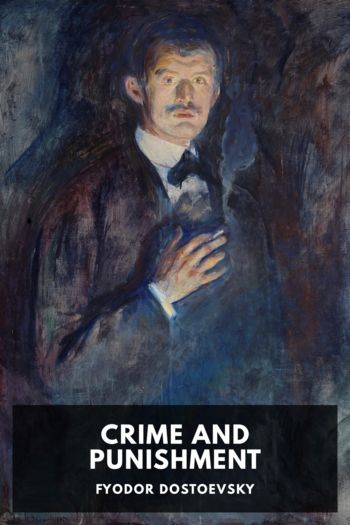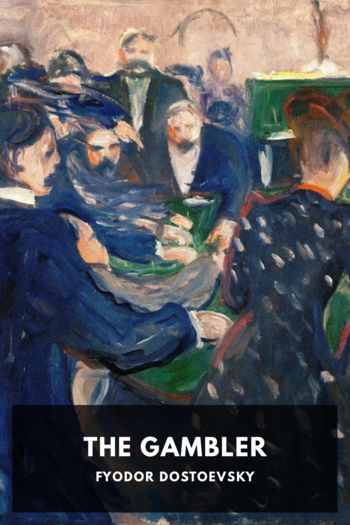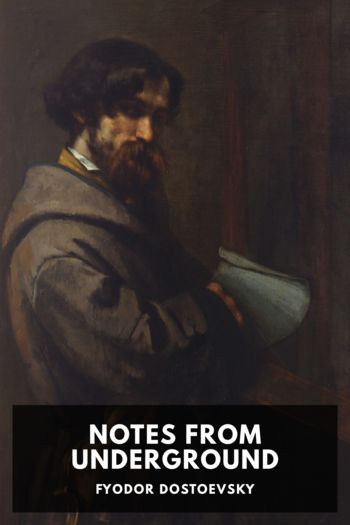Crime and Punishment by Fyodor Dostoevsky (love novels in english TXT) 📕

- Author: Fyodor Dostoevsky
Book online «Crime and Punishment by Fyodor Dostoevsky (love novels in english TXT) 📕». Author Fyodor Dostoevsky
From old habit he took his usual walk in the direction of the Hay Market. A dark-haired young man with a barrel organ was standing in the road in front of a little general shop and was grinding out a very sentimental song. He was accompanying a girl of fifteen, who stood on the pavement in front of him. She was dressed up in a crinoline, a mantle and a straw hat with a flame-coloured feather in it, all very old and shabby. In a strong and rather agreeable voice, cracked and coarsened by street singing, she sang in hope of getting a copper from the shop. Raskolnikov joined two or three listeners, took out a five kopeck piece and put it in the girl’s hand. She broke off abruptly on a sentimental high note, shouted sharply to the organ grinder “Come on,” and both moved on to the next shop.
“Do you like street music?” said Raskolnikov, addressing a middle-aged man standing idly by him. The man looked at him, startled and wondering.
“I love to hear singing to a street organ,” said Raskolnikov, and his manner seemed strangely out of keeping with the subject—“I like it on cold, dark, damp autumn evenings—they must be damp—when all the passersby have pale green, sickly faces, or better still when wet snow is falling straight down, when there’s no wind—you know what I mean?—and the street lamps shine through it …”
“I don’t know. … Excuse me …” muttered the stranger, frightened by the question and Raskolnikov’s strange manner, and he crossed over to the other side of the street.
Raskolnikov walked straight on and came out at the corner of the Hay Market, where the huckster and his wife had talked with Lizaveta; but they were not there now. Recognising the place, he stopped, looked round and addressed a young fellow in a red shirt who stood gaping before a corn chandler’s shop.
“Isn’t there a man who keeps a booth with his wife at this corner?”
“All sorts of people keep booths here,” answered the young man, glancing superciliously at Raskolnikov.
“What’s his name?”
“What he was christened.”
“Aren’t you a Zaraïsky man, too? Which province?”
The young man looked at Raskolnikov again.
“It’s not a province, your excellency, but a district. Graciously forgive me, your excellency!”
“Is that a tavern at the top there?”
“Yes, it’s an eating-house and there’s a billiard-room and you’ll find princesses there too. … La-la!”
Raskolnikov crossed the square. In that corner there was a dense crowd of peasants. He pushed his way into the thickest part of it, looking at the faces. He felt an unaccountable inclination to enter into conversation with people. But the peasants took no notice of him; they were all shouting in groups together. He stood and thought a little and took a turning to the right in the direction of V⸺.
He had often crossed that little street which turns at an angle, leading from the marketplace to Sadovy Street. Of late he had often felt drawn to wander about this district, when he felt depressed, that he might feel more so.
Now he walked along, thinking of nothing. At that point there is a great block of buildings, entirely let out in dram shops and eating-houses; women were continually running in and out, bareheaded and in their indoor clothes. Here and there they gathered in groups, on the pavement, especially about the entrances to various festive establishments in the lower storeys. From one of these a loud din, sounds of singing, the tinkling of a guitar and shouts of merriment, floated into the street. A crowd of women were thronging round the door; some were sitting on the steps, others on the pavement, others were standing talking. A drunken soldier, smoking a cigarette, was walking near them in the road, swearing; he seemed to be trying to find his way somewhere, but had forgotten where. One beggar was quarrelling with another, and a man dead drunk was lying right across the road. Raskolnikov joined the throng of women, who were talking in husky voices. They were bareheaded and wore cotton dresses and goatskin shoes. There were women of forty and some not more than seventeen; almost all had blackened eyes.
He felt strangely attracted by the singing and all the noise and uproar in the saloon below … someone could be heard within dancing frantically, marking time with his heels to the sounds of the guitar and of a thin falsetto voice singing a jaunty air. He listened intently, gloomily and dreamily, bending down at the entrance and peeping inquisitively in from the pavement.
“Oh, my handsome soldier
Don’t beat me for nothing,”
trilled the thin voice of the singer. Raskolnikov felt a great desire to make out what he was singing, as though everything depended on that.
“Shall I go in?” he thought. “They are laughing. From drink. Shall I get drunk?”
“Won’t you come in?” one of the women asked him. Her voice was still musical and less thick than the others, she was young and not repulsive—the only one of the group.
“Why, she’s pretty,” he said, drawing himself up and looking at her.
She smiled, much pleased at the compliment.
“You’re very nice looking yourself,” she said.
“Isn’t he thin though!” observed another woman in a deep bass. “Have you just come out of a hospital?”
“They’re all generals’ daughters, it seems, but they have all snub noses,” interposed a tipsy peasant with a sly smile on his face, wearing a loose coat. “See how jolly they are.”
“Go along with you!”
“I’ll go, sweetie!”
And he darted down into the saloon below. Raskolnikov moved on.
“I say, sir,” the girl shouted after him.
“What is it?”
She hesitated.
“I’ll always be pleased to spend an hour with you, kind gentleman, but now I feel shy. Give me six kopecks for a drink, there’s a nice young man!”
Raskolnikov gave her what came first—fifteen kopecks.
“Ah, what a good-natured gentleman!”
“What’s your name?”
“Ask for Duclida.”
“Well, that’s too much,” one of the women observed, shaking her head at Duclida. “I don’t know how you can ask





Comments (0)